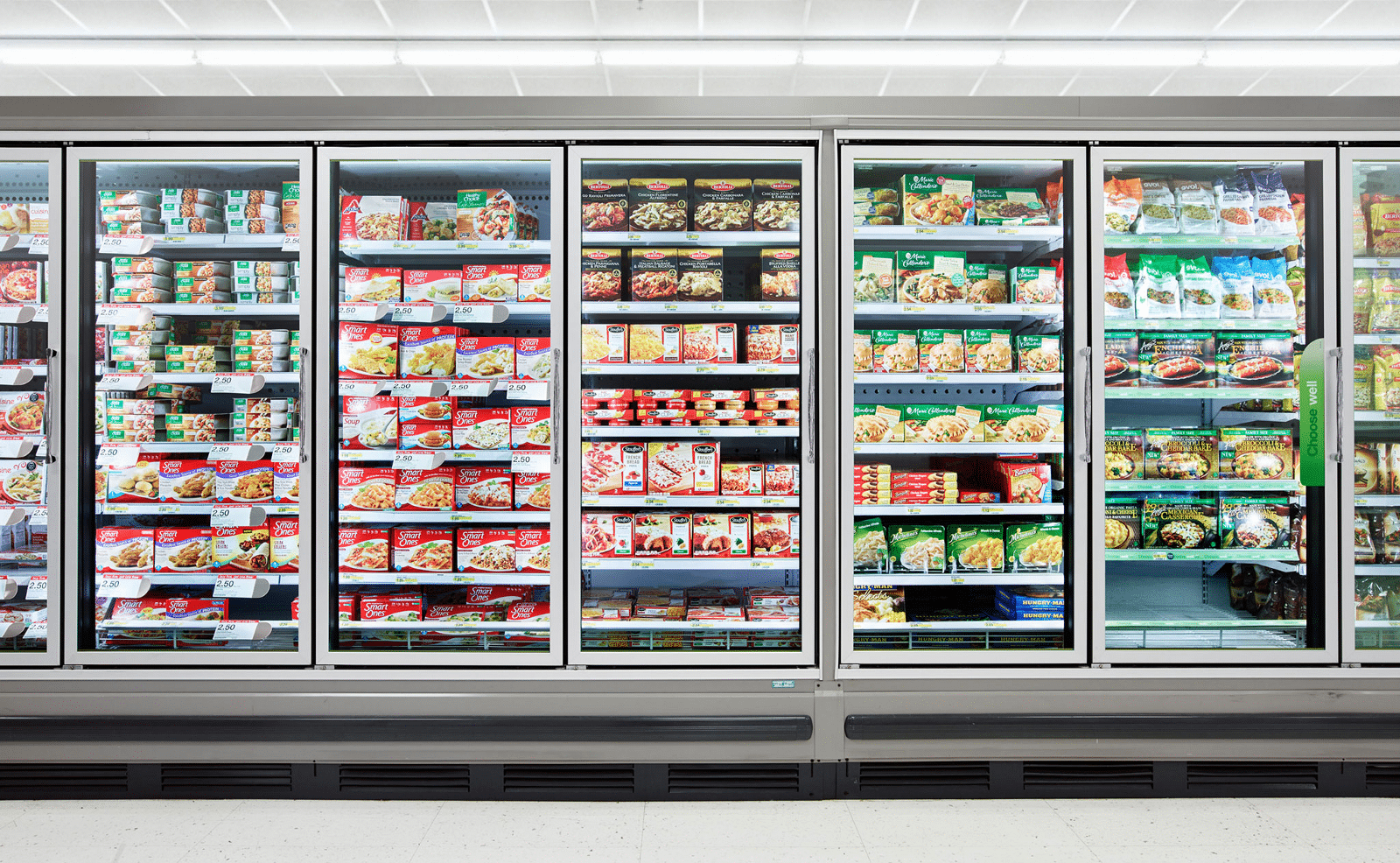Frozen foods—convenient or concerning? Health nuts like to remind you to shop the perimeter of the grocery store, focusing on fresh foods. But sometimes necessity wins, especially during these times when we’re reducing the number of runs we make to get groceries. So, frozen blueberries must be better than no fruit at all, right?!
The good news: frozen foods definitely can be healthy—if you make smart choices. Frozen fruits and vegetables actually retain a lot of nutrients, in some cases even more than their fresh counterparts. The best choices include minimally messed-with fruit, veggies, and seafood. What you want to avoid are the many processed foods you’ll have to pass along the way. Remember these tips the next time you turn your cart down the freezer aisle.

Fruit boasts the most nutrients when harvested at peak ripeness. But unfortunately, most fruit is actually picked green, to make it sturdier and easier to transport, and it may spend weeks sitting on a ship or truck while traveling across the country (or world!) Sitting in your fridge for a few more days only means more nutrient losses. In that case, frozen might be the better alternative. Berries, cherries, mangos, peaches, and pineapple are all great choices. Keep an eye out for added sugars. You only want to see fruit listed under ingredients on the label.
Green peas and sweet corn are ideal candidates for freezing. Peas are particularly high in natural sugars, but unless you can pick and eat them same day, they’ll taste sweeter if promptly frozen. Cruciferous vegetables like broccoli, cauliflower, and Brussels sprouts hold onto their health benefits, but they suffer in terms of squidgy texture when reheated. Spinach and butternut squash get a little grainy, but they’re packed with nutrients and super convenient to throw into a casserole, lasagna, or pureed soup. Most veggies are blanched before freezing, so check for sodium, since salt can sneak into the cooking liquid, and avoid sauce packets.
Push on past those chicken nuggets, pizzas, lasagnas, pot pies, burritos, spring rolls, and samosas. Oh right, and ice cream. And the toaster waffles. The point is, there are a lot of prefab foods dominating the freezer aisle. Unless you’re vigilant about reading labels, it’s not always clear what you’re getting. Preservatives, tenderizers, breading, frying, and sauces are where saturated fat, sodium, and sugar start to sneak in.
The good news: frozen foods definitely can be healthy—if you make smart choices. Frozen fruits and vegetables actually retain a lot of nutrients, in some cases even more than their fresh counterparts. The best choices include minimally messed-with fruit, veggies, and seafood. What you want to avoid are the many processed foods you’ll have to pass along the way. Remember these tips the next time you turn your cart down the freezer aisle.
Frozen foods—convenient or concerning? Health nuts like to remind you to shop the perimeter of the grocery store, focusing on fresh foods. But sometimes necessity wins, especially during these times when we’re reducing the number of runs we make to get groceries. So, frozen blueberries must be better than no fruit at all, right?!
Want to make the healthiest shopping decisions at the grocery store? Shop the outer aisles, right?
“Frozen options tend to be very convenient because they are in appropriate portion sizes and sometimes packaged individually, so you only use what you need,” Cundiff said.
Organic may — or may not — be better: Oft-misunderstood, an “organic” label doesn’t actually refer to the health content of a frozen item. Follow the same eat-smart tips for organic as for non-organic frozen foods.
Keep it safe: While frozen foods are safe to eat for an indefinite time period, their quality may deteriorate or vary from food type to food type.
The key is monitoring any ingredients that aren’t inherent in the product — say, added flavorings and their accompanying sodium content — no more than 140 mg, said Cundiff.
Frozen Food Review – Is There Anything Healthy In The Freezer Aisle?!
FAQ
What is the recommended freezer storage?
Should you visit the freezer aisle?
Visiting the freezer aisle is an essential part of most people’s shopping trips. Almost 40% of all people who buy frozen food consume it daily or several times weekly (per The Food Industry Association ), which means frozen items are perpetually in high demand. But buying these frozen items can be kind of an obstacle course.
Do professional chefs rely on the freezer aisle?
But if you thought that the freezer aisle was reserved for regular home cooks looking for shortcuts and sweets, you’d be mistaken. We asked professional chefs to share their favorite freezer picks and were shocked to find out that they rely on it just as much as we do.
What can chefs eat in the freezer?
Turns out, the freezer aisle is full of chef-approved picks. Here are some of our favorite chefs and their must-have frozen finds. 1. Frozen Peas “Frozen peas are extremely versatile, packed with nutrition, and are usually sweeter than their fresh counterparts.
Should you go to the freezer first?
Don’t be tempted to flip this on its head: Heading to the freezer aisle first, or even at the midpoint of your trip, can result in having frozen food in the basket for far longer than is advisable, exposing it to the ambient temperature of the supermarket and causing it to thaw.
